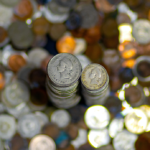Silver returned to the limelight in May when prices surged to near one-year high. The boost in prices largely came from industrial demand, especially from China. Silver is more of an industrial metal even though both gold and silver are regarded as safe-haven investments.
The commodity has both industrial and investment applications, but during the past few years, industrial uses of this metal have significantly increased. The industrial sector accounts for around 60% of silver use worldwide, with the remaining 40% going to investments. China plays an increasingly important role in the global silver industry. The country is the second-largest consumer and one of the top producers of the commodity. However, the recent string of downbeat economic releases from China highlighted intensifying pressure on their economy and thus the demand for silver.
After witnessing an initial rebound in the first quarter, China’s economy has come to grips with long-standing problems and slowing global demand for its products. The consensus forecasts for each of the major activity indicators have fallen short in recent months. A weaker-than-expected retail sales, industrial production, and fixed asset investment numbers indicate that the world’s second-largest economy is slowing down.
Higher interest-yielding assets like US Treasury bonds are providing more attractive opportunities for investors as a result the sentiment for precious metals has been beaten down. Safe haven assets like gold and silver have a negative relationship with interest rates. Nowadays, US assets offer high yields on expectations of further rate hikes.
The US dollar gained over 3.6% last month. The high US greenback usually weighs the outlook on commodities that are denominated in dollars.
The balance between demand-supply would be a key factor in pricing. According to data from the Silver Institute, global demand for silver is higher than supply. Silver demand has increased by 38% since 2020 while production recorded a shortfall.Silver production from primary mines declined due to lower by-product output, particularly from China and Peru. The most significant decline reported from Peru has been attributed mostly to mine suspensions, falling grades at several major mines, and disruption due to social unrest.
Meanwhile, new markets for silver have emerged as a result of technological advancements and alterations in consumer behaviour. The industrial demand is largely supported by electrification within the automotive segment and other power generation and distribution investments.
As per the Silver Institute data, jewellery fabrication soared to a record level last year primarily due to Indian demand. Silverware demand from India almost doubled last year as employment and income returned to pre-pandemic levels.
Looking ahead, there are expectations of solid demand for the commodity but if China is unable to reignite its economy major price gains are unlikely. Safe haven demand amid ongoing geopolitical tensions and forecast of supply shortages may offer a further boost to the metal. On the price front, London Spot prices remain congested in $26.50-19.50 an ounce levels initially, and either side breakout would suggest fresh short-term directions.
Head of Commodities at Geojit Financial Services








